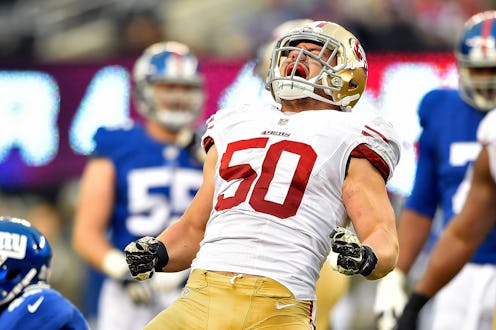News
A NFL Player Just Retired At 24 For A Good Reason
In spite of all the things that went horribly for the NFL last season, including myriad domestic violence scandals and furious criticism of commissioner Roger Goodell, the sport still looks every bit the dominant force in American culture. But Monday, a rising star among last year's rookie class made a decision that's shaken the football world, and it might actually do what's long seemed impossible — give the league a legitimate reason to sweat. On ESPN's Outside The Lines program Monday, NFL star Chris Borland announced his retirement at the young age of 24, citing long term risk of brain trauma as the motivating force behind his decision.
You'd be forgiven if the name "Chris Borland" doesn't set off many associations in your mind. For starters, he was a rookie last year, which is part of why this is so stunning. A linebacker for the San Francisco 49ers, Borland stepped in as a starter for the final six games of last year, and a little over one-third of a season established himself as perhaps the best per-snap player at his position in the game. His exciting presence was basically the sole source of relief for 49ers fans after Hall of Fame-worthy linebacker Patrick Willis retired at the surprisingly early age of 30 this month, albeit for entirely different stated reasons.
Basically, Borland had millions upon millions of dollars ahead of him, but only if he was willing to sign that same devil's deal that all NFL players do — putting your brain at risk for cash, glory and fame. And he said no.
As far as potentially seismic moves in the NFL go, this is inspirational in a way that transcends the sport. Whether you like football or not — hell, whether you give a damn about any professional sport — what Borland has done is an incredible statement. It reflects both the increasing knowledge the players themselves have about the inherent risks of football, and a shining example of someone putting science and self-care above the glimmering allure of superstardom. Speaking on Outside The Lines, Borland explained his decision:
I just honestly want to do what's best for my health. ... I feel largely the same, as sharp as I've ever been. For me, it's wanting to be proactive. I'm concerned that if you wait 'til you have symptoms, it's too late.
There are a lot of unknowns. I can't claim that X will happen. I just want to live a long, healthy life, and I don't want to have any neurological diseases or die younger than I would otherwise. ... From what I've researched and what I've experienced, I don't think it's worth the risk.
Make no mistake, this news probably set some teeth gnashing at the NFL's headquarters. Borland will be replaced, sure, and the league will likely try to move on as if nothing happened. But the long-term effects of repeated concussions on the brain and becoming better and better understood as time goes by. Last year, the exemplary long-running PBS series Frontline dived into the concussion crisis in football, and turned up a shocking and illustrative statistic: out of the 79 brains of ex-football players examined by the Department of Veterans Affairs’ brain repository, 76 of them showed signs of chronic traumatic encephalopathy (CTE), a debilitating neurodegenerative disorder.
Borland specifically spoke about players who'd come and gone before him who'd fallen to the brain disease, which can manifest in pain, dementia, aggression and depression. A number of ex-NFL stars later shown to be suffering from CTE ended up killing themselves, including Junior Seau, Ray Easterling, and Dave Duerson. In Duerson's case, he fatally shot himself in the chest rather than the head, and left a tragic suicide note asking that his brain be delivered "to the NFL's brain bank."
Suffice to say, there's plenty of evidence nowadays to make people think twice about taking on the enormous health risks associated with playing football. And even if there are people willing to step into the breach and take Borland's place, this could have a big impact — now every concerned parent or guardian who doesn't want their child to put their brain at-risk has a role model to point to, and one that did something a lot more courageous than anything seen on a football field.
Images: Getty Images (2)
